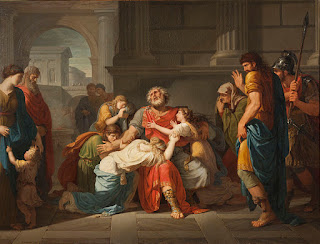The Waste Land
The Waste Land is a long poem by T. S. Eliot, widely regarded as one of the most important poems of the 20th century and a central work of modernist poetry. Published in 1922, the 434-line, poem first appeared in the United Kingdom in the October issue of Eliot's The Criterion and in the United States in the November issue of The Dial.
It was published in book form in December 1922. Among its famous
phrases are "April is the cruellest month", "I will show you fear in a
handful of dust", and the mantra in the Sanskrit language "Shantih shantih shantih".
Eliot's poem loosely follows the legend of the Holy Grail and the Fisher King combined with vignettes of contemporary British society. Eliot employs many literary and cultural allusions from the Western canon, Buddhism and the Hindu Upanishads. The poem shifts between voices of satire and prophecy featuring abrupt and unannounced changes of speaker, location, and time and conjuring a vast and dissonant range of cultures and literatures.
The poem's structure is divided into five sections. The first section, "The Burial of the Dead," introduces the diverse themes of disillusionment and despair. The second, "A Game of Chess," employs vignettes of several characters—alternating narrations—that address those themes experientially. "The Fire Sermon," the third section, offers a philosophical meditation in relation to the imagery of death and views of self-denial in juxtaposition influenced by Augustine of Hippo and eastern religions. After a fourth section, "Death by Water," which includes a brief lyrical petition, the culminating fifth section, "What the Thunder Said," concludes with an image of judgment.
Eliot originally considered entitling the poem He do the Police in Different Voices. In the version of the poem Eliot brought back from Switzerland, the first two sections of the poem—'The Burial of the Dead' and 'A Game of Chess'—appeared under this title. This strange phrase is taken from Charles Dickens' novel Our Mutual Friend, in which the widow Betty Higden says of her adopted foundling son Sloppy, "You mightn't think it, but Sloppy is a beautiful reader of a newspaper. He do the Police in different voices." Some critics use this working title to support the theory that, while there are many different voices (speakers) in the poem, there is only one central consciousness. What was lost by the rejection of this title Eliot might have felt compelled to restore by commenting on the commonalities of his characters in his note about Tiresias, stating that 'What Tiresias sees, in fact, is the substance of the poem.'
In the end, the title Eliot chose was The Waste Land. In his first note to the poem he attributes the title to Jessie L. Weston's book on the Grail legend, From Ritual to Romance. The allusion is to the wounding of the Fisher King and the subsequent sterility of his lands; to restore the King and make his lands fertile again, the Grail questor must ask, "What ails you?" A poem strikingly similar in theme and language called "Waste Land," written by Madison Cawein, was published in 1913 in Poetry.
The poem's title is often mistakenly given as "Waste Land" (as used by Weston) or "Wasteland", omitting the definite article. However, in a letter to Ezra Pound, Eliot politely insisted that the title was three words beginning with "The".
Eliot's poem loosely follows the legend of the Holy Grail and the Fisher King combined with vignettes of contemporary British society. Eliot employs many literary and cultural allusions from the Western canon, Buddhism and the Hindu Upanishads. The poem shifts between voices of satire and prophecy featuring abrupt and unannounced changes of speaker, location, and time and conjuring a vast and dissonant range of cultures and literatures.
The poem's structure is divided into five sections. The first section, "The Burial of the Dead," introduces the diverse themes of disillusionment and despair. The second, "A Game of Chess," employs vignettes of several characters—alternating narrations—that address those themes experientially. "The Fire Sermon," the third section, offers a philosophical meditation in relation to the imagery of death and views of self-denial in juxtaposition influenced by Augustine of Hippo and eastern religions. After a fourth section, "Death by Water," which includes a brief lyrical petition, the culminating fifth section, "What the Thunder Said," concludes with an image of judgment.
Eliot originally considered entitling the poem He do the Police in Different Voices. In the version of the poem Eliot brought back from Switzerland, the first two sections of the poem—'The Burial of the Dead' and 'A Game of Chess'—appeared under this title. This strange phrase is taken from Charles Dickens' novel Our Mutual Friend, in which the widow Betty Higden says of her adopted foundling son Sloppy, "You mightn't think it, but Sloppy is a beautiful reader of a newspaper. He do the Police in different voices." Some critics use this working title to support the theory that, while there are many different voices (speakers) in the poem, there is only one central consciousness. What was lost by the rejection of this title Eliot might have felt compelled to restore by commenting on the commonalities of his characters in his note about Tiresias, stating that 'What Tiresias sees, in fact, is the substance of the poem.'
In the end, the title Eliot chose was The Waste Land. In his first note to the poem he attributes the title to Jessie L. Weston's book on the Grail legend, From Ritual to Romance. The allusion is to the wounding of the Fisher King and the subsequent sterility of his lands; to restore the King and make his lands fertile again, the Grail questor must ask, "What ails you?" A poem strikingly similar in theme and language called "Waste Land," written by Madison Cawein, was published in 1913 in Poetry.
The poem's title is often mistakenly given as "Waste Land" (as used by Weston) or "Wasteland", omitting the definite article. However, in a letter to Ezra Pound, Eliot politely insisted that the title was three words beginning with "The".



Comments
Post a Comment